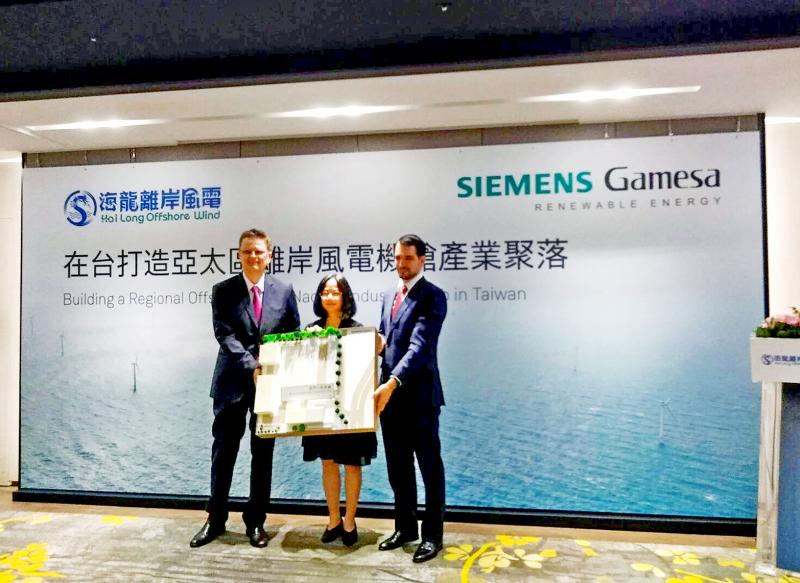Wind turbine manufacturer Siemens Gamesa Renewable Energy SA (SGRE) yesterday said it plans to expand its production capacity in Taiwan to deliver turbines for the Hai Long 2 wind farm while aiming to capture growing market opportunities in Asia.
After inking a preferred supplier agreement last year with the Hai Long offshore wind farm project (海龍離岸風電計畫), developed by Canada’s Northland Power Inc and Singapore’s Yushan Energy Pte (玉山能源), SGRE is to supply wind turbines for the latter’s 300 megawatt (MW) wind farm 50km off the coast of Changhua County.
Abiding by local content rules, the company is partnering with local suppliers, including casting component maker Yeong Guan Energy Technology Group Co (永冠能源), cable manufacturer Sinbon Electronics Co (信邦電子) and chemical materials specialist Atech Composites Co (先進複材).

Photo: Natasha Li, Taipei Times
Pointing to its nacelle assembly facility that is under construction at the Port of Taichung, SGRE said that it plans to double the plot size and construction area in Taichung with two new production halls and a warehouse by leasing an additional 3 hectares of land from Taiwan International Ports Corp (TIPC, 台灣港務).
SGRE last year leased 3 hectares from TIPC to deliver 111 8MW wind turbines to Orsted Taiwan Ltd (沃旭能源) for its 900MW offshore wind farm in Changhua.
“We will manufacture bigger and more powerful wind turbines for the Hai Long project ... [of] over 11MW in power capacity,” SGRE chairman and managing director Niels Steenberg told a news conference in Taipei yesterday, adding that the Taichung plant would have an annual output of 2 gigawatts by 2024.
Despite posting losses of 165 million euros (US$178.4 million) last fiscal quarter due to supply chain disruptions caused by the COVID-19 pandemic, the company said that it is more than ever committed to invest in Taiwan.
“Taiwan will become our regional hub for Asia... Besides supplying the Taiwan market, it [the Taichung facility] would also serve markets in Japan and [South] Korea,” Steenberg said, adding that the company would also expand its local workforce from 100 employees to 500 by 2024.
With the Hai Long project still under review by the Industrial Development Bureau, SGRE is betting big on its Taichung plant.
“We are willing to take this risk, because all predictions are showing really big growth here in Asia,” Steenberg told the Taipei Times, hinting that the Taichung plant could potentially supply the company’s upcoming wind project in the Philippines.
Although the wind energy industry is “still very Eurocentric ... there would soon be more turbines installed in Asia than in Europe,” he added.
Having supplied 20 6MW wind turbines for the second phase of Formosa I Wind Power Co’s (海洋風力發電) offshore wind farm project, SGRE is to deliver another 47 8MW turbines for Formosa II Wind Power Co’s (海能風力發電) 376MW project this year.
The company would also install 80 wind turbines off the coast of Yunlin County for Wpd Taiwan Energy Co’s (達能能源) 640MW wind farm by next year.

Zhang Yazhou was sitting in the passenger seat of her Tesla Model 3 when she said she heard her father’s panicked voice: The brakes do not work. Approaching a red light, her father swerved around two cars before plowing into a sport utility vehicle and a sedan, and crashing into a large concrete barrier. Stunned, Zhang gazed at the deflating airbag in front of her. She could never have imagined what was to come: Tesla Inc sued her for defamation for complaining publicly about the vehicles brakes — and won. A Chinese court ordered Zhang to pay more than US$23,000 in

Taiwan Semiconductor Manufacturing Co (TSMC, 台積電) yesterday held its first board of directors meeting in the US, at which it did not unveil any new US investments despite mounting tariff threats from US President Donald Trump. Trump has threatened to impose 100 percent tariffs on Taiwan-made chips, prompting market speculation that TSMC might consider boosting its chip capacity in the US or ramping up production of advanced chips such as those using a 2-nanometer technology process at its Arizona fabs ahead of schedule. Speculation also swirled that the chipmaker might consider building its own advanced packaging capacity in the US as part

‘NO DISRUPTION’: A US trade association said that it was ready to work with the US administration to streamline the program’s requirements and achieve shared goals The White House is seeking to renegotiate US CHIPS and Science Act awards and has signaled delays to some upcoming semiconductor disbursements, two sources familiar with the matter told reporters. The people, along with a third source, said that the new US administration is reviewing the projects awarded under the 2022 law, meant to boost US domestic semiconductor output with US$39 billion in subsidies. Washington plans to renegotiate some of the deals after assessing and changing current requirements, the sources said. The extent of the possible changes and how they would affect agreements already finalized was not immediately clear. It was not known

Taiwan Semiconductor Manufacturing Co (TSMC, 台積電) yesterday said that its investment plan in Arizona is going according to schedule, following a local media report claiming that the company is planning to break ground on its third wafer fab in the US in June. In a statement, TSMC said it does not comment on market speculation, but that its investments in Arizona are proceeding well. TSMC is investing more than US$65 billion in Arizona to build three advanced wafer fabs. The first one has started production using the 4-nanometer (nm) process, while the second one would start mass production using the